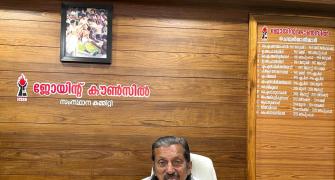Indian business process outsourcing firms have managed to beat the appreciating rupee better than their IT counterparts.
This is despite the fact that the rupee appreciated around 13 per cent over the last one year, and analysts predict that the rising rupee, coupled with the subprime crisis fallout, would hit them hard.
The concerns were legitimate as unlike the IT industry, more than 90 per cent of the cost of BPOs is in rupees while earnings are in dollars.
However, the firms have managed well by focusing on increasing productivity, enhancing employee utilisation, increasing billing rates and effecting better management strategies.
Take, for instance, the case of Nasdaq-listed WNS Global Services. While the company lost a client, which meant a loss of 5 per cent of revenues, it eventually went on to give an upward revision for the financial year 2008 after revising it downward initially.
"If you look at the July-September quarter, the rupee was much more stable, hence BPOs have managed well. Secondly, other than the mortgage business in the banking segment the others have not been affected, or the effect is yet to be seen. Hence these firms have done well," reasons Siddharth Pai, partner, TPI.
Similarly, Syntel, a Nasdaq-listed BPO, with more than 80 per cent of its employees in India, managed its margins well despite the rising rupee pressure. On a quarter-on-quarter basis the rupee impact on gross margins was 1.3 per cent which had an impact of $300,000, while overall margins of the company saw an impact of $500,000 -$600,000.
On a year-on-year basis, the rupee impact on margins was close to 11 per cent. On a sequential basis, the company's net income grew 13.5 per cent and revenues were up 9.3 per cent.
Keshav R Murugesh, president and chief operating officer, Syntel, said, "About 51 per cent of the global cost is done in rupee denomination. However, we are pleased with the solid performance during the quarter, as Syntel continues to see incremental benefits from aggressive investments in people, new offerings, and infrastructure."
Apart from increasing productivity and efficiency, most of the BPOs have also increased their billing rates. For all the new contracts, Syntel has increased its billing by 3-5 per cent.
Ram Panickar, CFO, Intelenet Global Services says, "For all future contracts rates are being negotiated with clients considering the new forex rates. As for our existing contracts, the loss due to the rupee appreciation is partly covered by our forex covers as also our foreign exchange loans which act as a natural hedge for our foreign exchange earnings."
In some of the cases the geography spread of these companies have helped them to manage well.
Raju Venkatraman, Joint MD and COO Firstsource feels that the company managed well because of the natural hedging that is has in terms of geography spread.
"About 45 per cent of our revenues come from US and UK each. Whereas 10 per cent from India. The growth in the domestic market has been a good source of hedging for us," he adds.
Same is the case of 24x7 Customers. While it has 50 per cent of revenues from US, UK contributes 35 per cent and the rest is distributed between Canada and Australia.
But Venkatraman believes that without the US market one cannot build a multi-million dollar company. So does that mean that the value proposition of India as a preferred destination diminishes?
"No, India will continue to be important centre for us. Our capex for 2008 is expected to be $65 million. Besides no other country provides the scale for growth in numbers," says Murugesh.








